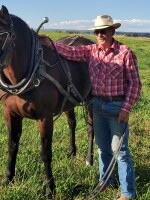
Bob Bragg
Farm News & Views HostBob has been an agricultural educator and farm and ranch management consultant for over 40 years in southwest Colorado. He writes about agricultural issues from his farm near Cortez, and has helped to produce farm reports on KSJD for more than a dozen years.
-
Farm and ranchers receive only a small portion of total food costs, agriculture may be one of the first industries to meet net-zero emissions goals, and how conservationists and ranchers are working together to save grassland bird populations.
-
Lab-grown meat's carbon footprint, hay harvest yields are looking good in the Four Corners, and breaking down the cost of a 4th of July cookout meal.
-
New York may become the first state in the country to ban the use of neonicotinoid-treated seeds, Congress takes steps to prevent China, Russia, North Korea, and Iran from buying U.S. farmland, drought conditions are affecting many farmers in the upper Midwest, and the Colorado Department of Agriculture begins its annual monitoring season for agricultural pests.
-
Record setting drought in the Texas Panhandle is creating challenges for farmers and ranchers there, grain like rice, corn, and wheat are supplying over 50% of the food calories consumed globally, cyber crime is a very real concern for U.S. agriculture, and the USDA reports that $100 million of farm income is lost annually in the U.S. due to soil erosion.
-
U.S. farm exports are set to decrease by 8% this year, climatologists are suggesting that the U.S. will see a shift from La Nina to El Nino conditions this summer, almost one-third of winter wheat acreage could be abandoned this year, prices for beef for grilling will be higher this summer, and a new business is using mini and micro burros to serve drinks at parties and other events.
-
Drought in the Southwest sees big improvement, farmland prices remain stagnant, and cattle producers are optimistic about building herds back after recent setbacks.
-
Farmers in the Great Plains may abandon 85% of their wheat acres, the shift of land from agricultural production to urban uses could impact future food security, and the U.S. Supreme Court rules that a California law banning the sale of pork from pigs that were raised in tightly confined spaces was lawful.
-
A breakdown of what appropriations will be included in the new Farm Bill, the USDA boosts farm loan relief for producers, and Colorado State University is selected to run one of 12 regional food business centers as part of a new U.S. Department of Agriculture program.
-
The Southwest is seeing an easing of drought conditions but parts of the country are still dry, farmers taking irrigation water from the Ogallala Aquifer may need a different approach, how the 1930s Dust Bowl affected soil conservation, and a look at the downside of avocado production.
-
New USDA grant funding is available for meat and poultry producers, Southwest Colorado Meat and Livestock Day scheduled on May 11th, the shifting landscape of farm sizes and subsidies, and solar "farms" innovate to better serve rural communities.


